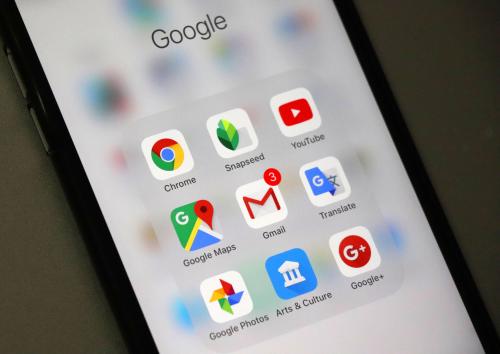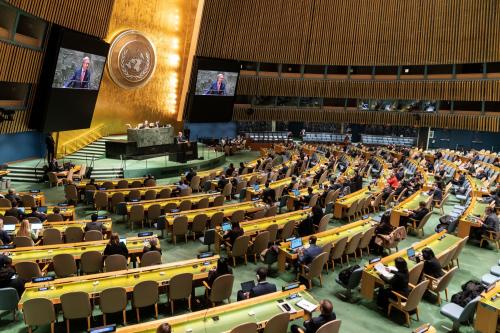Late Wednesday night, President Trump issued executive orders that will effectively ban two major Chinese apps from the U.S. market. The orders state that, 45 days from now, Americans will be prohibited from carrying out any transactions with the parent companies of TikTok and WeChat—meaning U.S. companies and individuals couldn’t advertise with the platforms, offer them for download via app stores, or enter into licensing agreements with them. The decision will have both immediate and long-term implications for the companies and their American consumers, for U.S.-China relations, and for the broader conflict over the future of the internet.
Why is the US government banning TikTok and WeChat?
The executive orders argue TikTok and WeChat should be banned from the U.S. market due to national security concerns. Yet on the surface neither appear to touch on traditional issues of national security, such as access to classified information on weapons or intelligence systems. Instead, the concern is primarily around data security and data privacy. TikTok is a social networking app for sharing short user-produced video clips, popular particularly among teenagers, with an estimated 100 million users in the U.S. and many more around the world. WeChat is a “super app” which includes messaging, social media, and payment platforms; while it is not as popular in the U.S. as TikTok, it is extensively used by the Chinese diaspora to connect with family and friends in China. Like other social networking apps, both TikTok and WeChat collect extensive data on their users, and the core American concern appears to be that the Chinese government will be able to access this data and potentially leverage it for espionage or blackmail. U.S. officials also worry the apps censor political speech and could be used to spread misinformation.
Behind the scenes there are several broader motivations likely also contributing to American action against TikTok and WeChat. The move is a significant escalation in ongoing technology tensions between the U.S. and China, building on earlier U.S. action against hardware companies such as Huawei and ZTE. It also reflects some officials’ desire for greater reciprocity in the U.S.-China relationship, given that many U.S. technology companies cannot operate freely in China.
Does Trump have the authority to do this?
The short answer is yes.
There are two main avenues the administration could in principle use to limit the actions of foreign companies in the U.S. to address national security concerns. The first is through the Committee on Foreign Investment in the United States (CFIUS), which is an interagency committee with authority to review, block, and where necessary compel divestment of foreign acquisitions of U.S. businesses. TikTok, which entered the U.S. market when its Chinese owner ByteDance purchased the musical.ly app and rebranded it, had reportedly been under CFIUS review since late last year. In recent weeks there was growing speculation that CFIUS would soon issue an order requiring ByteDance to sell TikTok U.S., with Microsoft emerging as the most likely buyer.
The Trump administration, however, did not issue a CFIUS declaration, and instead acted through the second channel available to it: the International Emergency Economic Powers Act (IEEPA). Designed to allow presidents to respond to emergency national security concerns, IEEPA grants the White House sweepingly broad authority to intervene in economic markets, so long as actions are tied to a formally declared emergency. (In this case, both the TikTok and WeChat orders reference a prior announcement from last May on “Securing the Information and Communications Technology and Services Supply Chain” as the basis for action.) IEEPA has broader jurisdiction and a more extensive list of remedies than CFIUS. Acting through IEEPA rather than CFIUS allows the White House to target WeChat in addition to TikTok, and to require not only divestment but to block any future transactions with Americans.
The White House likely chose to act through IEEPA precisely because it grants the administration such wide latitude to intervene however it deems necessary. Yet this decision is likely to further accelerate debates over reforming IEEPA and the need to rein in this presidential power and prevent its abuse. Over the past several decades, presidents have increasingly turned to IEEPA to carry out foreign economic policy, almost entirely beyond the scope of any congressional review. Pushback to the TikTok and WeChat bans will likely spur renewed interest in this question.
What happens next?
The restrictions in the executive orders are set to take effect in just 45 days, meaning there is a very tight time frame for government officials, consumers, and companies to adjust. Yet it seems many of the details have not yet been fully worked out—both executive orders leave it to the commerce secretary to specify precisely what transactions are banned and which might still be allowed. Thus, much may still be decided in the coming days.
For TikTok, the most immediate question is how this will influence a possible acquisition by Microsoft. Microsoft had previously publicly announced its interest in acquiring TikTok and was in advanced talks with both the U.S. government and ByteDance to work out the details of such a transaction subject to any CFIUS concerns. But in the last few days, President Trump has declared that he expected any such deal to also include a substantial payment to the U.S. Treasury—a request without any clear founding in CFIUS statutes, and which may have raised some red flags for Microsoft. The new IEEPA ruling now means any sale of TikTok would need to be complete within 45 days, and also seemingly would prevent any ongoing commercial relationships between TikTok U.S. assets owned by Microsoft and TikTok operations still owned by ByteDance operating in other countries. This would appear to make it impossible for certain star TikTok performers to have licensing deals integrated across TikTok platforms, for instance, or for any joint branding. Wednesday’s declaration thus likely lowers the value of TikTok U.S. to Microsoft (or any other potential acquirer). If this ultimately quashes a deal and leads TikTok to entirely pull out of the U.S. market, the Trump administration may face political ramifications from 100 million disappointed users of the app in the U.S.
With respect to WeChat, meanwhile, the biggest immediate question is how well the app will be able to continue functioning after the ban goes into effect. The ban would seemingly block new downloads or updates of WeChat from any app stores within the U.S., but would not cut off access overnight. Continued functionality of WeChat is an important concern for the Chinese diaspora in the U.S.; in part because access to many American social network apps is blocked in China, WeChat is a primary communication tool for students and immigrants to keep in touch with friends and family in China.
Over the longer term, the TikTok and WeChat orders will also have a lasting impact on U.S.-China relations. Chinese officials and state-owned media were already mobilizing against any U.S. action on TikTok and are likely to look for mechanisms to retaliate now that the executive orders have been announced. The U.S. and China have already been battling over Huawei’s global expansion, with the State Department seeking to convince other countries around the world to exclude the Chinese tech giant from their 5G infrastructure systems. If the U.S. begins similarly targeting TikTok and WeChat, this would open a new front in the ongoing technology conflict.
The executive orders also underline what’s at stake in the potential “decoupling” of the U.S. and Chinese economies, and raise the prospect of a splintered global internet. We appear to be headed toward a world where the internet applications available to citizens differ based on where they live—and the geopolitical commitments of their home country governments. Of course, this has long been the case in China, where the Chinese Communist Party’s ”Great Firewall” has significantly limited how the internet is experienced in China in line with its own political objectives. But if this move signals the U.S. government is going to follow a similar path, then a broader rupturing of the global internet may be at hand.
Finally, the announcements may also serve to chill other would-be Chinese investors considering entering the U.S. market, especially in the technology sector. Foreign investors are used to thinking about political risks when operating in developing countries with weak legal institutions and rule of law. But the TikTok and WeChat bans suggest that, in an era of heightened geoeconomic competition, political risk should be a core concern for any global company attempting to operate across the U.S.-China divide. TikTok and WeChat are finding out what the NBA learned last year, which is that it will be increasingly difficult for individual firms to insulate themselves from broader geopolitical conflicts. The prospect of heightened CFIUS review was already chilling Chinese investment into Silicon Valley—the Trump administration’s latest strikes against TikTok and WeChat will only accelerate this trend.





Commentary
Why is the Trump administration banning TikTok and WeChat?
August 7, 2020